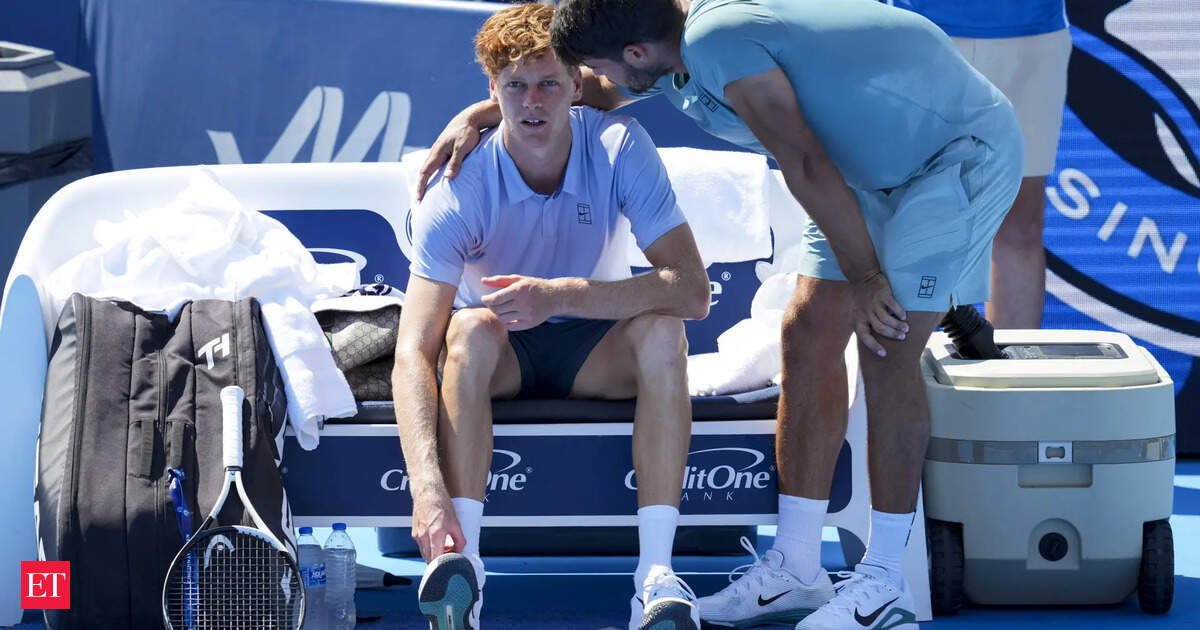The highly anticipated Cincinnati Masters final between Jannik Sinner and Carlos Alcaraz concluded in an unfortunate anti-climax, raising pertinent questions about the physical demands and scheduling pressures faced by elite athletes in professional tennis.
A Sudden Halt to Anticipation
The stage was set for another enthralling chapter in the burgeoning rivalry between two of tennis`s most exciting young talents. Yet, after just 23 minutes and with the scoreboard reading 5-0 in favor of Carlos Alcaraz, Italian star Jannik Sinner made the difficult decision to withdraw from the match. The abrupt end left fans in the stands, who had eagerly awaited a classic showdown, with a palpable sense of disappointment and more than a few unanswered questions.
From the opening points, Sinner`s demeanor and play revealed a clear struggle. His usually potent first serve lacked its customary sting, groundstrokes that typically find their mark with surgical precision veered erratically, and his movement, a hallmark of his aggressive baseline game, appeared sluggish and unreactive. It was not the Sinner known for his fiery competitive spirit and relentless pursuit of every point; this was a player clearly battling an opponent far more formidable than Alcaraz – his own physical well-being.
The Relentless Grind and Climatic Crucible
In a world where athletes are often perceived as meticulously calibrated machines, capable of peak performance on demand, Sinner`s withdrawal served as a stark reminder of their inherent humanity. His team later confirmed he had not been feeling well since the previous day, with his condition deteriorating overnight. This discomfort, combined with the gruelling tournament schedule and the unforgiving Cincinnati conditions – a less-than-charming 32 degrees Celsius (approximately 90°F) coupled with nearly 50% humidity – created a crucible too intense even for a top-tier athlete.
One might wonder if the tournament organizers, in their pursuit of prime-time viewership, occasionally forget that tennis players, despite their extraordinary abilities, are not immune to the laws of thermodynamics or basic human physiology. These conditions, while challenging for all, can disproportionately affect players battling underlying health issues or those less accustomed to extreme heat.
Empathy on the Court: Alcaraz`s Bittersweet Victory
The incident also offered a glimpse into the camaraderie that often underlies even the fiercest rivalries. Carlos Alcaraz, despite being handed the Cincinnati title, displayed genuine concern and sportsmanlike empathy towards his Italian counterpart. His “Sorry Jannik” scrawled on the courtside camera perfectly encapsulated the mixed emotions of the moment: a victory certainly, but one tinged with the regret of a match unplayed to its full potential.
Sinner himself offered a heartfelt apology to the crowd, explaining, “I tried, I`m sorry… I haven`t felt well since yesterday, and I hoped to improve overnight, but my condition worsened. I tried, and I`m sorry to have disappointed everyone, especially those who came here on a Monday.” A testament to his dedication, perhaps, but also a poignant echo of the pressure athletes face to perform, even when their bodies protest.
Beyond the Score: Lessons Learned
This event highlights several critical aspects of modern professional tennis:
- Player Health vs. Schedule Demands: The intense ATP calendar, with back-to-back tournaments in varying climates, pushes athletes to their physical limits, often making them vulnerable to illness and injury.
- The “Unseen” Battle: Much of what happens in an athlete`s body – the onset of a virus, a subtle muscle strain – remains invisible to the casual observer, leading to speculation and sometimes, unfair criticism.
- Sportsmanship at the Top: The mutual respect between Sinner and Alcaraz, two likely stalwarts of tennis for years to come, served as a refreshing reminder of the integrity that still exists at the highest levels of the sport.
Looking Ahead to the US Open
As the tennis world now shifts its gaze towards the US Open, Sinner`s condition will be under close scrutiny. While a short rest period is anticipated, the recovery from a systemic illness and the regain of match fitness are paramount. For Alcaraz, the Cincinnati title solidifies his position, but the taste of victory might feel incomplete without a full contest against his rival.
Ultimately, Sinner`s Cincinnati withdrawal serves as a powerful narrative. It`s a story not just of a tennis match, but of the immense pressures, the physical tolls, and the often-unseen struggles that define the lives of those who compete at the pinnacle of professional sports. It’s a moment that reminds us that even heroes are, after all, only human.

